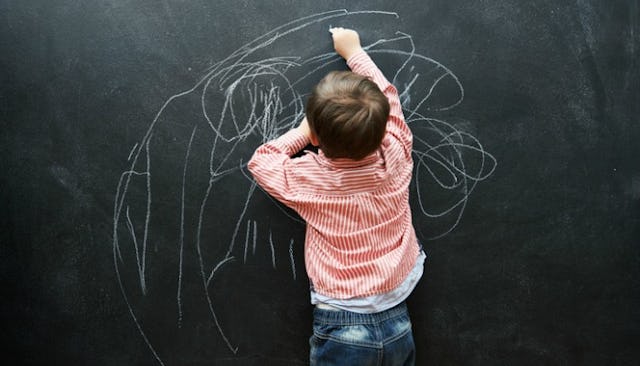Perfectionist Parents Limit Their Children's Creativity, So It's Okay To Lighten Up

Who doesn’t want perfection? We want it for our kids because they are capable of anything. And that puts a very real pressure on us as parents to ensure that they are equipped with absolutely everything they need to achieve their wildest dreams.
We may not say it out loud, but we quietly yearn for children who get straight As, MVPs, Academy Awards, Nobel Prizes. Anything less means that either we’ve failed them as parents, or they’ve failed us as children.
Society pressures us to be perfect parents. To parent the perfect child. To fill our history books and holiday cards with the triumphs of our magnificence.
But here’s the wake-up call: Perfectionism imposes huge limits to what children can become.
Perfection is an illusion.
Seth Godin, best-selling author and thought leader, contends that perfection doesn’t actually exist. And in fact, perfection is a just a handcuff that limits our ability to create meaningful change.
“Perfect is an illusion, one that was created to maintain the status quo. […] Perfect lets you stall, ask more questions, do more reviews, dumb it down, safe it up and generally avoid doing anything that might fail (or anything important).” – Seth Godin
No, Billy, I’m terribly sorry, but your finger painting isn’t a masterpiece. Because it doesn’t need to be. It’s a finger painting. The point isn’t perfection; it’s self-expression.
The artists who changed the world didn’t emerge from the womb painting breathtaking works of art. All told, Picasso produced 50,000 pieces — not all of them groundbreaking. But he spent a lifetime finding new ways to express himself, undeterred by the burden of every piece being perfect. And that’s the kind of creatively freeing mindset that leads to true originality.
Preparing children for a future that no one can predict is not about making them perfect; it’s about encouraging their naturally childlike instincts to be messy, to express themselves, and to have fun doing it.
Perfection is the enemy of bravery.
In her moving TED Talk, Reshma Saujani warns that our instinct to teach perfection can cripple a child’s ability to dive in and take risks:
“Most girls are taught to avoid risk and failure. We’re taught to smile pretty, play it safe, get all A’s. Boys, on the other hand, are taught to play rough, swing high, crawl to the top of the monkey bars and then just jump off headfirst. And by the time they’re adults, whether they’re negotiating a raise or even asking someone out on a date, they’re habituated to take risk after risk. They’re rewarded for it. It’s often said in Silicon Valley, no one even takes you seriously unless you’ve had two failed start-ups. In other words, we’re raising our girls to be perfect, and we’re raising our boys to be brave.”
And while Ms. Saujani is talking specifically about the way we raise our girls, it sparks an even bigger discussion about the effect that “perfect parenting” can have on inhibiting our children’s natural curiosity and creative bravery.
Perfectionism breeds caution, hesitation, risk-aversion, the safe path.
All of which are creatively inhibiting to anyone who wants to try something different, or mess around with bringing a new idea into the world.
If we’ve been coasting on straight As our whole life, why would we ever dare risk taking an unusual and less-traveled road that might result in a soul-crushing B-minus?
Understandably, most kids don’t.
In defense of less-than-perfect parenting.
The good news? We can all take the pressure off of trying to be perfect or to feel the need to raise perfect kids.
Because, spoiler alert, you’re not perfect.
As the world-famous artist and creative genius Salvador Dali put it:
“Have no fear of perfection. You’ll never reach it.”
The modern world doesn’t need “perfect” people. It needs determined, 10,000-hour crusaders who not only tolerate imperfection, but fully embrace it. It needs parents and children who love the challenges they can’t solve, and love the struggle of surprising themselves by solving them.
You’re not perfect.
Your kids aren’t perfect.
Albert Einstein. Rosa Parks. Steve Jobs.
Not perfect.
When you take away the expectations of perfection from the creative equation, you take the pressure off. The fear of failure becomes a little less scary. It becomes a little easier to take a risk, to try something out, to brave the creative unknown.
And that’s when anything can happen.